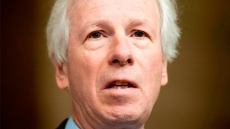OTTAWA — Canadian aid agencies have met several times with International Development Minister Marie-Claude Bibeau since the Liberals took power so when they received an invite to sit down with her last week in Ottawa, it wasn't unusual.
Notable, though, was who else was there: Defence Minister Harjit Sajjan.
Humanitarian and development support has been part of Canada's contribution to the international fight to rout Islamic militants in Iraq and Syria for the last 18 months, but the Liberals' recent refocusing of the mission to place greater emphasis on that support leaves the government grappling with a problem: how to get Canadians onside without putting the work of those delivering that aid at risk.
It's a communications quandry more than anything else — link the military and humanitarian contributions too closely and it creates the perception that humanitarian groups aren't the neutral and impartial bodies they must be in order to operate in conflict zones.
"If you use an integrated or whole-of-government approach, you have to be very careful on the activities that you conduct and the way that you call them," said Stephen Cornish, executive director of Doctors Without Borders, who called Sajjan's presence at the meeting a positive sign.
While Bibeau has made it clear humanitarian principles will be respected, having Sajjan in the room was significant, said Gillian Barth, president and CEO of CARE Canada, who was also at the meeting.
"We haven't had the opportunity in the past to engage with the minister of defence," she said.

"And while it's important to keep humanitarian distinct from the other pillars, we recognize also we still need to have civilian-military co-operation in certain areas so it's important that everybody is on the same page."
Making the case directly to the minister was important given a mistake the previous government made last year.
In the spring, when the anti-ISIL mission was broadened to include bombing targets in Syria, a page was put up on the Foreign Affairs website with photographs highlighting Canada's work. One was of a fighter jet and next to it a picture of international aid workers handing out supplies.
NGOs quickly picked up the phone and demanded the pictures be removed, worried that connecting their workers to fighter jets would make them targets. The photos were pulled down immmediately. The incident wasn't attributed to malice, just a misunderstanding, aid groups said.
Issues like that are why the meeting was convened, said Bernard Boutin, a spokesman for Bibeau.
"This is why we were having this conversation — to make sure the perception of independence is maintained."
A spokesperson for Sajjan said the minister wanted to be in the room because of his international experience and awareness of the work NGOs do.
"It is important to the government of Canada that we work with our international partners to promote peace and stability worldwide," Jordan Owens said in an email.

Sajjan has seen first hand the "whole of government" approach play out before. He served in Afghanistan, where it was first used by the Canadian government during the fight against the Taliban, where as part of counter-insurgency strategy, the three pillars — military, humanitarian aid and diplomacy — were linked together.
The results were mixed. Development projects with short-term goals were prioritized in a bid to help shore up military gains, but little long term change was achieved, according to a federal government evaluation of the Afghan aid program.
Concerns do exist the current mission could go down the same path.
"I have a bit of the impression that we're going down the same road when I hear 'all of government' in that the CF is doing stuff, but nobody is quite sure what anyone else is doing," Sen. Colin Kenny said to Chief of Defence Staff Gen. Jonathan Vance during a committee hearing this past week.
"I think we do know what we're doing as a country," Vance replied.
The fight against ISIL is not the same as that aga

"This is Iraq's war to fight, and we are supporting Iraq and the region with the contributions through the various Canadian government ministries and others to address a wider range than just the military effort," he said.





